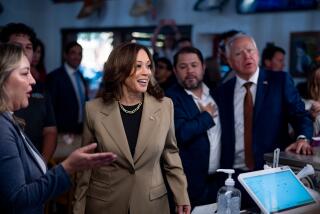Culture : Mexico Elite Relishes an Eye-Opener : Breakfast is a major power meal in political circles. On the three-course menu are deals, gossip, maybe a little work.
MEXICO CITY â Power broker Francisco Galindo Ochoa is seated at his table in the posh Veranda restaurant, the same strategically located table where he has eaten breakfast almost every morning for the better part of a political career that spans half a century.
He sits with his back to the wall, eyes to the entrance and--on this morning--with the nattily dressed Atty. Gen. Ignacio Morales Lechuga by his side. They are deep in conversation, but not too deep to greet the procession of journalists and politicians who must pass by the table en route to their own.
Half a dozen times during breakfast, the gentlemen remove linen napkins from their laps and rise from tapestry armchairs for a back-slapping political embrace--that man-on-man hug that makes so much noise but insists on several inches of air space between bellies.
Then they return to what, from across a roomful of duck prints and brass chandeliers, looks very, very important: their power breakfast.
âThis is the political breakfast,â explains Leon Garcia Soler, an Excelsior newspaper columnist with vast breakfast experience. âIâm not sure how much work gets done, but some deals are made, political and otherwise. It is a way to see your friends and be seen by others, which is not a little thing in politics. Journalists meet politicians. Politicians meet politicians. Really, a lot of it is just gossip.â
Really?
In Mexico, breakfast is a word often used in political circles to mean a two-hour, three-course meal beginning around 8:30 a.m. at restaurants such as LâHeritage for senators, La Chiminea for those close to the presidentâs office in Los Pinos, the Lincoln for old-time pols and the Veranda, where former presidential spokesman Galindo Ochoa holds court.
The tablecloths are white, the waiters wear gray and the chauffeurs wait outside. The leather-bound menus offer elegant dishes such as eggs Benedict and practical ones such as prunes.
The patrons generally are men, many with dyed hair and cellular phones firmly in their grip. Their heads turn ever so slightly as they enter the restaurant and scan the tables for an acquaintance. âFor a politician there is nothing worse than to arrive at a restaurant and find no one to greet him,â says El Financiero newspaper columnist Raymundo Riva Palacio. âIt is a syndrome. If at least five people donât greet him when he arrives, his eyes start to burn, his throat hurts, he becomes nauseous, feels faint. He ceases to exist.â
At La Chiminea on the next morning, Riva Palacio greets President Carlos Salinas de Gortariâs brother, Raul, who is breakfasting with Bacardi Rum president Isaac Chertorivski at the executiveâs usual table. He also embraces Mayor Manuel Camachoâs press secretary and nods in the direction of the presidentâs Olympian jogging partner.
âBreakfast is a public symbol of power and information. If you want to talk about serious things, you invite your guest to have breakfast at your office or your house,â Riva Palacio explains.
âMorales Lechuga had breakfast here with Jorge Carpizo (president of the government human rights commission) last month. Why? If they really wanted to resolve something they wouldnât do it in public. They wanted to show that everything is OK,â he says.
Around him, men in dark suits sit with their heads together, nodding, sipping coffee. They talk about free trade and elections that may or may not be free. They trade information and talk business that they prefer not to do over the telephone. Useful gossip, you might say.
Just how the political breakfast became de rigueur is open to some debate. Galindo Ochoa traces its origin to Gen. Rodolfo Sanchez Taboada, president of the PRI, as the ruling party is called, in the mid-1940s. A reputed teetotaler, the general wanted to take political business out of the bars and into more civilized arenas.
Back then a politicianâs importance could be measured by the size of his Stetson. Hats went out of style in the 1960s with President Adolfo Lopez Mateos, who refused to wear one, and leather jackets remained popular until technocrats took over the government in the 1980s and brought in the Brooks Brothers look.
Now good taste and good breakfast go hand in hand. The maitre dâ at the Veranda wears tails with a pink cummerbund and bow tie. The tables are adorned with silver vases of pink carnations next to the jams and butter plates.
âI think the whole thing makes for a helluva waste of time,â sniffs Excelsiorâs Garcia Soler, who often finds himself at two or three breakfasts a week.
Galindo Ochoa strongly disagrees.
âThere is commentary. Political work is talk. You analyze men and deeds,â he says.
At the end of breakfast, he stands with the attorney general, who waves goodby across the room. They make their way out of the restaurant, most likely to their offices, where politicians usually arrive at elevenish. No doubt they will spend several hours at work before leaving at about 3 p.m. for that other political must--the power lunch.
More to Read
Sign up for Essential California
The most important California stories and recommendations in your inbox every morning.
You may occasionally receive promotional content from the Los Angeles Times.










